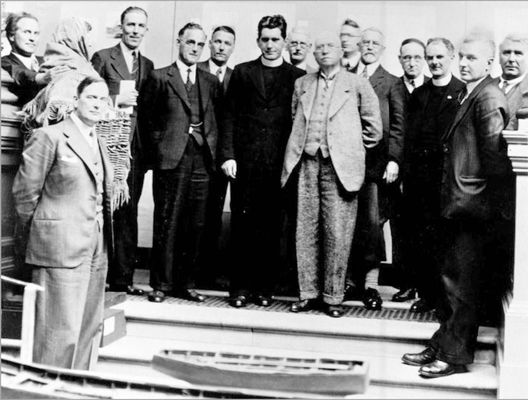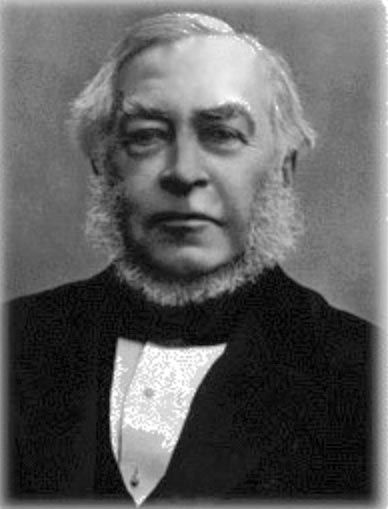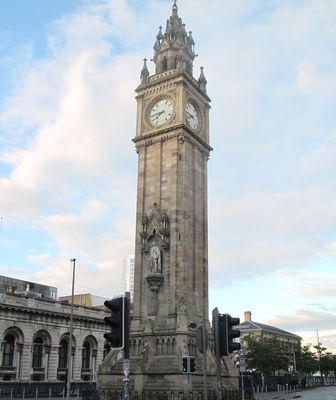“HE had the spirit of the true and gentle knight. He knew how to do things quite simply. He was full of high-bred chivalry towards him, the ignorant and the poor. He gave everything to them, and it made him happy to take Poverty as his bride for the good of men…”
These words were spoken at the graveside of a man whose work for the impoverished people of Ireland in the nineteenth century is all but forgotten.
Vere Foster was born in Copenhagen in 1819 where his father was a British diplomat. He died in Belfast in December 1900 and is buried in Belfast City Cemetery. He was educated at Eton and began a law degree at Oxford which he abandoned after two years and followed his father into the diplomatic service, during which period he was posted to Brazil and Uruguay. On his return to England in 1847, Foster visited Ireland. His family had an estate, Glyde Court, near Tallanstown in County Louth. Here he saw the effects of the Famine. He was horrified at the number of starving men, women and children he saw staggering along the roads. Many were desperately trying to reach a port where they might flee to a better life in another country. From here on, Vere Foster regarded himself as an Irishman and dedicated his entire life and the family fortune to help the poor people of the land.
Upon receiving news that his father was seriously ill in England, Vere paid 10 shillings for a first class ticket for a sailing from Drogheda to Liverpool. However, he did not stay in his cabin but was determined to witness the journey from a poor emigrant’s experiences. These people were on the first stage of their journey to America. Below decks, people were crowded together, far more than the ship was capable of holding, animals and livestock were herded in the same living space. There were no toilets or washing facilities. The noise, smell and prevailing sickness made it a nightmare journey. Arriving in Liverpool where they had to await the arrival of a ship bound for America, the problems were far from over. Many of the emigrants could only speak Irish and were easy fodder for unscrupulous robbers and conmen. So-called ‘porters’ made off with their meagre belongings and tricksters sold false tickets to America or ‘converted’ foreign currency giving a few cents in exchange for someone’s life savings.
Swindlers, known as crimps, sold the unsuspecting emigrants legal deeds for tracts of land in Canada and America, which were entirely false. Some landlords confiscated luggage so the traveller was forced to stay in their lodgings.
Vere Foster dedicated himself to addressing the plight of the Irish people. He set up a scheme whereby 40 girls in dire poverty would be enabled to emigrate to the USA. He felt that girls were the least able to improve their situations at home. Each emigrant was bought their ticket, food for the journey, clothing, cooking utensils and money for expenses till they found employment. Vere only asked in return that, when possible, they send some money back to Ireland to help other starving families.
In 1850 he boarded a schooner, the Washington, dressed as an emigrant. The people were herded together like cattle. He kept a diary of his experiences. The journey was to surpass even his worst fears.
For the first three days they were denied any supply of water. When the Washington finally docked at Sta Island in December 1850, Vere Foster and other seriously ill passengers were hospitalised. For two months his life lay in the balance. He was suffering from dysentery and damage to his right eye, due to a blow by a member of the ship’s crew.
As a result of his accounts of the journey, the British Government and the US Congress passed a new Passenger Act which improved conditions for emigrants.
On returning home, Vere Foster set up an office in Dublin to deal with applicants for his emigration programme. Not only would these people be aided to emigrate, they would be provided with employment and given temporary accommodation on arrival. All candidates had to prove their good character. However, these people were also penniless and Vere paid for their fares out of his own pocket.
Foster’s dedication to the Irish poor was so complete that he never married. He enlisted the help of a trusted shipping agent, Henry Boyd, who ensured only trustworthy ship owners and captains transported the emigrants. By using his family connections in Ireland and England, his enterprise was recommended to public figures and potential employers in New York and Washington.
Twice yearly Vere travelled to the US and Canada to ensure his clients had obtained the employment arranged for them. He encouraged these new settlers to befriend and support new arrivals. He also secured the backing of the Catholic Archbishop of New York, the Most Reverend John Joseph Hughes, and the local clergy to form a network of help for Irish emigrants. Vere Foster was to continue his Assisted Emigration project, at his own expense, until the outbreak of the American Civil War in 1861.
He became increasingly aware of the fact that the vast majority of those he helped to emigrate were illiterate, since the education system had been greatly damaged by the Famine. Most schools were too small with earthen floors, leaking roofs and no desks, books or maps not to mention a complete lack of lavatories. At this stage he turned his attention to helping schools and his work in this field greatly enhanced the system of education throughout Ireland.
To be continued...







